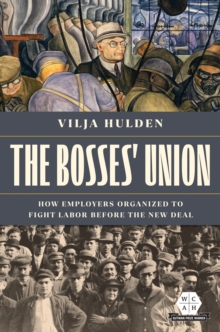Description
| Product ID: | 9780252044830 |
| Product Form: | Hardback |
| Country of Manufacture: | US |
| Series: | Working Class in American History |
| Title: | The Bosses' Union |
| Subtitle: | How Employers Organized to Fight Labor before the New Deal |
| Authors: | Author: Vilja Hulden |
| Page Count: | 348 |
| Subjects: | History of the Americas, History of the Americas, Industrial relations, occupational health and safety, Industrial relations, health & safety, USA, c 1800 to c 1900, 20th century |
| Description: | At the opening of the twentieth century, labor strife repeatedly racked the nation. Union organization and collective bargaining briefly looked like a promising avenue to stability. But both employers and many middle-class observers remained wary of unions exercising independent power. Vilja Hulden reveals how this tension provided the opening for pro-business organizations to shift public attention from concerns about inequality and dangerous working conditions to a belief that unions trampled on an individual's right to work. Inventing the term closed shop, employers mounted what they called an open-shop campaign to undermine union demands that workers at unionized workplaces join the union. Employer organizations lobbied Congress to resist labor's proposals as tyrannical, brought court cases to taint labor's tactics as illegal, and influenced newspaper coverage of unions. While employers were not a monolith nor all-powerful, they generally agreed that unions were a nuisance. Employers successfully leveraged money and connections to create perceptions of organized labor that still echo in our discussions of worker rights. At the opening of the twentieth century, labor strife repeatedly racked the nation. Union organization and collective bargaining briefly looked like a promising avenue to stability. But both employers and many middle-class observers remained wary of unions exercising independent power. Vilja Hulden reveals how this tension provided the opening for pro-business organizations to shift public attention from concerns about inequality and dangerous working conditions to a belief that unions trampled on an individual''s right to work. Inventing the term closed shop, employers mounted what they called an open-shop campaign to undermine union demands that workers at unionized workplaces join the union. Employer organizations lobbied Congress to resist labor''s proposals as tyrannical, brought court cases to taint labor''s tactics as illegal, and influenced newspaper coverage of unions. While employers were not a monolith nor all-powerful, they generally agreed that unions were a nuisance. Employers successfully leveraged money and connections to create perceptions of organized labor that still echo in our discussions of worker rights. |
| Imprint Name: | University of Illinois Press |
| Publisher Name: | University of Illinois Press |
| Country of Publication: | GB |
| Publishing Date: | 2023-01-24 |


